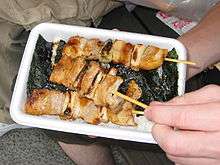Packed lunch


.jpg)
A packed lunch (also called pack lunch, sack lunch or bag lunch in North America, or pack up in the United Kingdom, as well as the regional variations: bagging in Lancashire, Merseyside and Yorkshire, [1]) is a lunch prepared at home and carried to be eaten somewhere else, such as school, a workplace, or at an outing. The food is usually wrapped in plastic, aluminum foil, or paper and can be carried ("packed") in a lunch box, paper bag (a "sack"), or plastic bag. While packed lunches are usually taken from home by the people who are going to eat them, in Mumbai, India, tiffin boxes are most often picked up from the home and brought to workplaces later in the day by so-called dabbawallas. It is also possible to buy packed lunches from stores in several countries. Lunch boxes made out of metal, plastic or vinyl are now popular with today's youth. Lunch boxes provide a way to take heavier lunches in a sturdier box or bag. It is also environmentally friendly.
In the United States, an informal meeting at work, over lunch, where everyone brings a packed lunch, is a brown-bag lunch or colloquially a "brown bag". There are also white and other color bags for seasonal use.
In politics
One such brown bag lunch was used as a deliberate rebuff of the Chinese hosts, by the United States delegation, at peace negotiations in Kaesong during the Korean War. The Chinese hosts offered lunch and watermelon to the U.S. guests, which the U.S. delegates, who considered lunching with one's opposition to be fraternizing with the enemy, rejected in favor of their own packed lunches.[2]
See also
- Airline meal, often a pre-packaged meal
- Bento
- Dosirak
- Lunch box
- Ploughman's lunch
- Tiffin
- TV dinner
References
| Wikivoyage has a travel guide for Packed food. |
- ↑ "BBC: Lancashire > Voices > Wordly Wise?". BBC. 31 May 2005. Retrieved 1 April 2014.
- ↑ Alfred D. Wilhelm, Jr. (1995). The Chinese at the Negotiating Table: Style and Characteristics. DIANE Publishing. p. 128. ISBN 0-7881-2340-8.